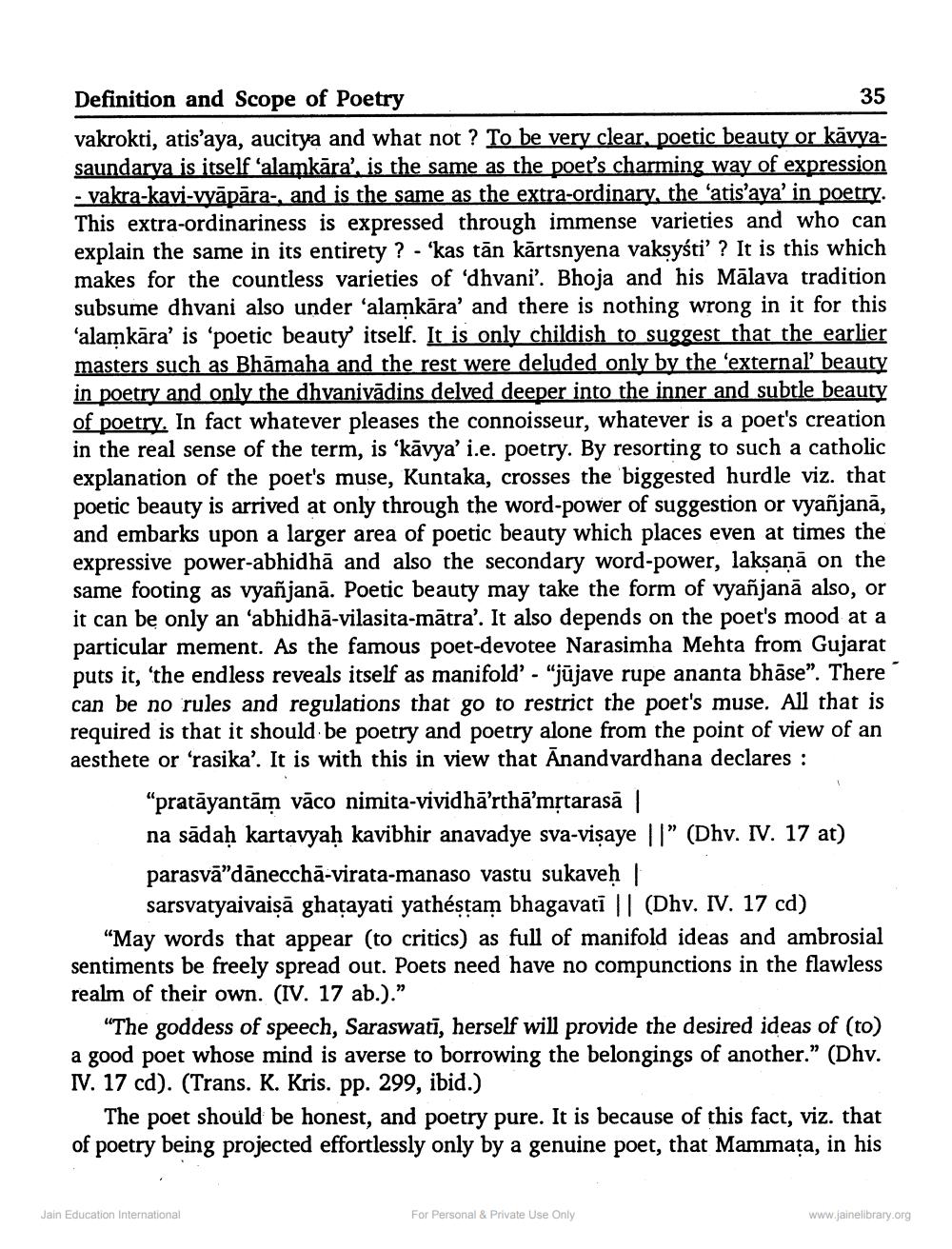________________
Definition and Scope of Poetry
35
vakrokti, atis'aya, aucitya and what not ? To be very clear, poetic beauty or kāvvasaundarva is itself 'alamkāra', is the same as the poet's charming way of expression - vakra-kavi-vyāpāra-, and is the same as the extra-ordinary, the ‘atis'aya' in poetry. This extra-ordinariness is expressed through immense varieties and who can explain the same in its entirety ? - kas tān kārtsnyena vaksysti'? It is this which makes for the countless varieties of dhvani'. Bhoja and his Mālava tradition subsume dhvani also under 'alamkāra' and there is nothing wrong in it for this 'alamkāra' is 'poetic beauty itself. It is only childish to suggest that the earlier masters such as Bhāmaha and the rest were deluded only by the 'external beauty in poetry and only the dhvanivādins delved deeper into the inner and subtle beauty of poetry. In fact whatever pleases the connoisseur, whatever is a poet's creation in the real sense of the term, is ‘kāvya' i.e. poetry. By resorting to such a ca explanation of the poet's muse, Kuntaka, crosses the biggested hurdle viz. that poetic beauty is arrived at only through the word-power of suggestion or vyañjanā, and embarks upon a larger area of poetic beauty which places even at times the expressive power-abhidhā and also the secondary word-power, laksaņā on the same footing as vyañjanā. Poetic beauty may take the form of vyañjanā also, or it can be only an 'abhidhā-vilasita-mātra'. It also depends on the poet's mood at a particular mement. As the famous poet-devotee Narasimha Mehta from Gujarat puts it, 'the endless reveals itself as manifold' - "jūjave rupe ananta bhāse". There can be no rules and regulations that go to restrict the poet's muse. All that is required is that it should be poetry and poetry alone from the point of view of an aesthete or 'rasika'. It is with this in view that Anandvardhana declares :
“pratāyantām vāco nimita-vividhā'rthā’mstarasā | na sādaḥ kartavyaḥ kavibhir anavadye sva-visaye ll” (Dhv. IV. 17 at) parasvā”dānecchā-virata-manaso vastu sukaveh |
sarsvatyaivaisā ghasayati yathéstam bhagavati || (Dhv. IV. 17 cd) "May words that appear (to critics) as full of manifold ideas and ambrosial sentiments be freely spread out. Poets need have no compunctions in the flawless realm of their own. (IV. 17 ab.)."
"The goddess of speech, Saraswati, herself will provide the desired ideas of (to) a good poet whose mind is averse to borrowing the belongings of another." (Dhv. IV. 17 cd). (Trans. K. Kris. pp. 299, ibid.)
The poet should be honest, and poetry pure. It is because of this fact, viz. that of poetry being projected effortlessly only by a genuine poet, that Mammața, in his
Jain Education International
For Personal & Private Use Only
www.jainelibrary.org




